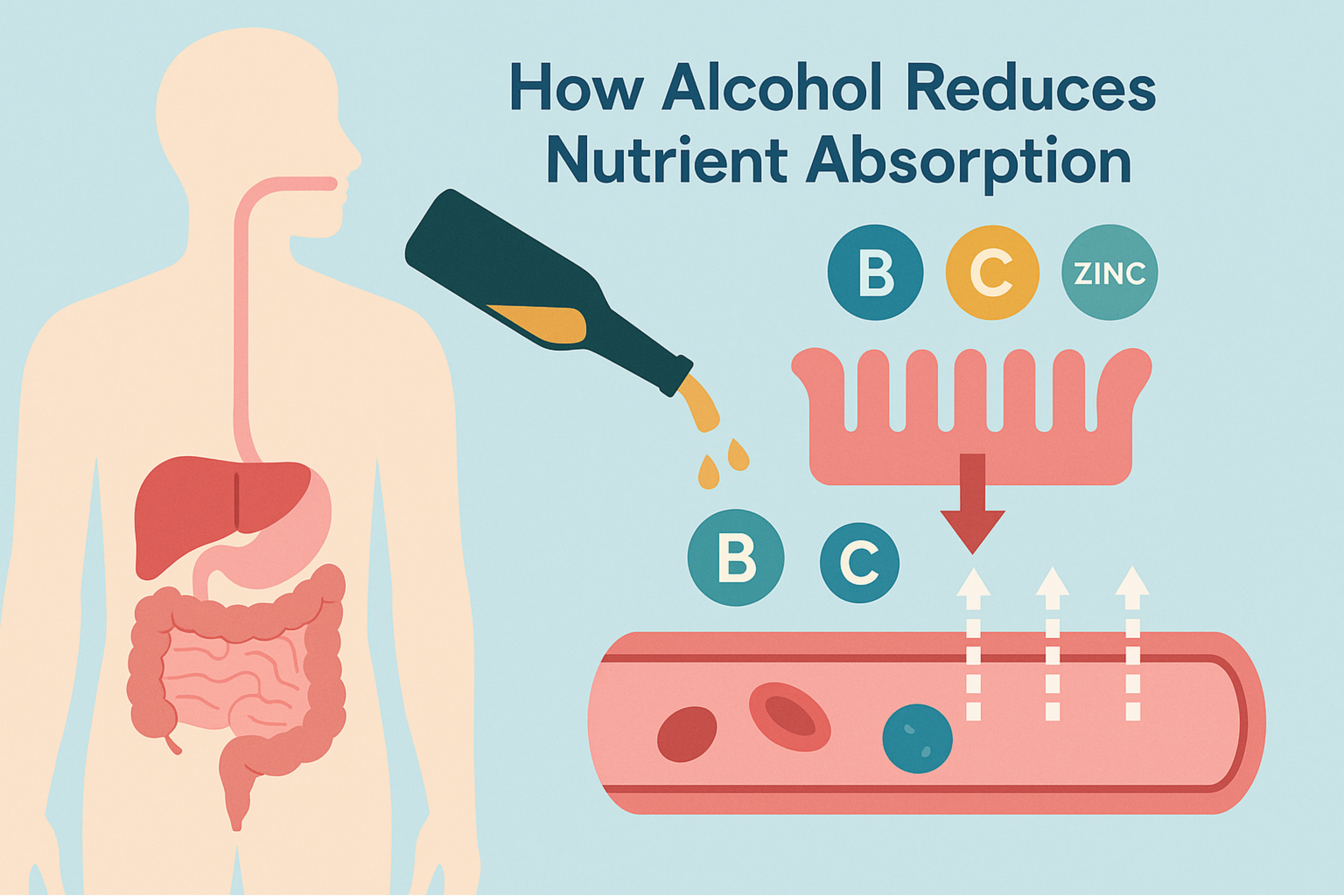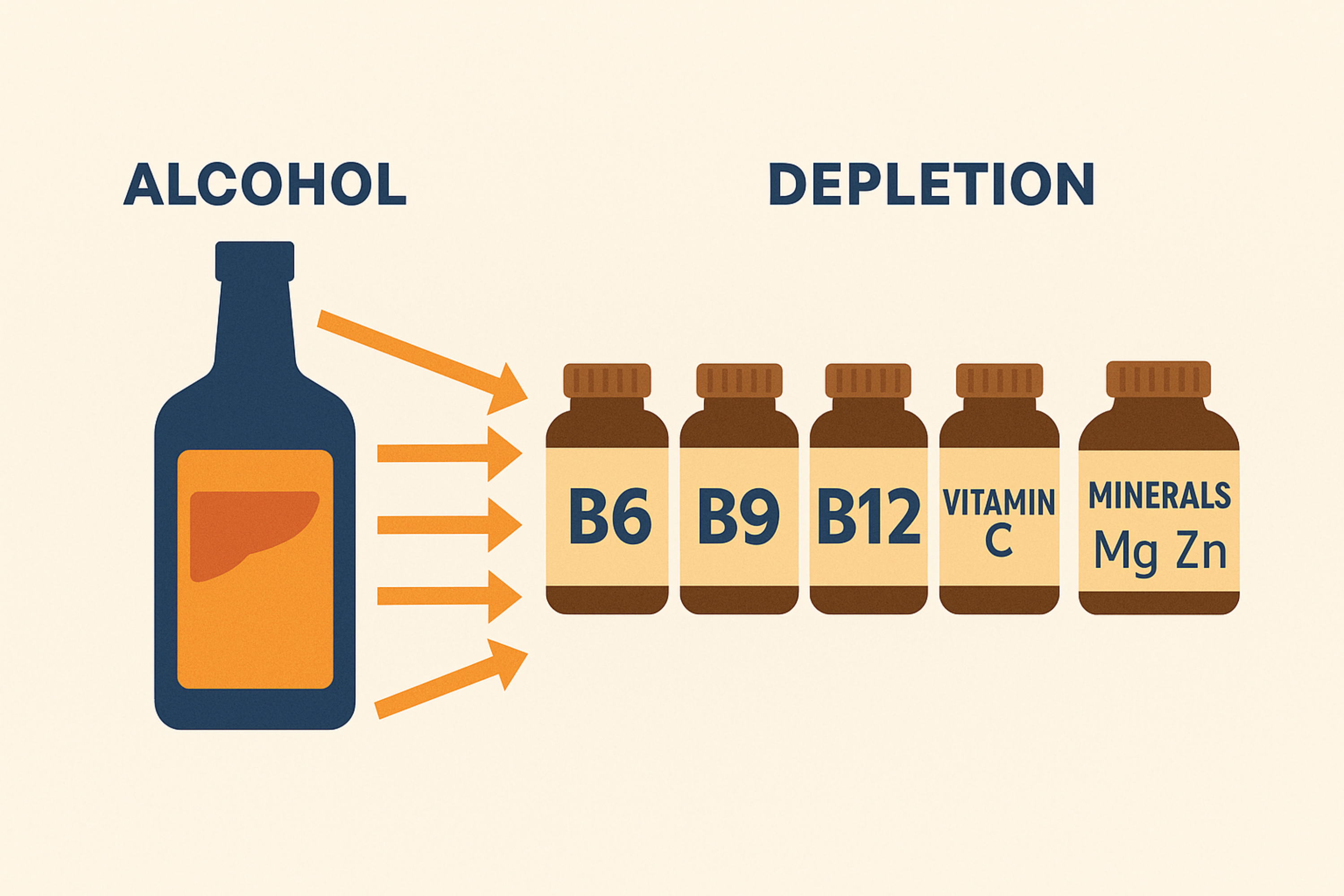Drinking alcohol doesn’t just affect hydration; it also interferes with the body’s ability to absorb and use essential vitamins and minerals. Heavy alcohol consumption and even moderate drinking can lead to nutrient deficiencies by disrupting intestinal absorption, lowering food intake, and straining the gastrointestinal tract and liver.
Over time, chronic alcohol use and repeated exposure can cause vitamin depletion, leaving the body short on vital nutrients needed for energy, immune responses, and tissue repair. Below is a clear breakdown of what vitamins alcohol depletes most, why these nutritional deficiencies happen, and the steps that can help restore balance.
How Does Alcohol Affect Vitamin Levels in the Body?
Alcohol changes the way the body handles essential nutrients at several points. It reduces nutrient absorption in the small intestine, making it harder for water-soluble vitamins and fat-soluble vitamins to enter the bloodstream.
It also interferes with the liver’s role in storing and processing vitamins, which becomes more serious with chronic alcohol consumption or alcoholic liver disease. In addition, heavy alcohol consumption increases vitamin loss through urine, leaving the body low on essential vitamins and minerals even when dietary intake seems adequate.

What Vitamins Does Alcohol Deplete the Most?
Alcohol use impacts many nutrients, but some vitamins and minerals are more vulnerable than others. The sections below explain which are most affected and why these nutritional deficiencies develop.
Vitamin B1 (Thiamine)
Vitamin B1, also known as thiamine, is vital for glucose uptake and energy metabolism. Alcohol dehydrogenase activity and alcohol’s effect on the gastrointestinal tract block thiamine absorption and lower storage levels in the liver. Thiamine plays a central role in energy metabolism, and low levels are more common in people with high alcohol intake.
Vitamin B6
Vitamin B6 is important for amino acid metabolism and nervous system function. Alcohol intake may interfere with how the body uses vitamin B6.
Folate (Vitamin B9)
Folate, or vitamin B9, supports DNA synthesis and red blood cell production. Chronic alcohol use reduces intestinal absorption and lowers the body’s ability to store folic acid. Folate supports red blood cell formation and DNA synthesis. Alcohol intake may reduce folate absorption, which can affect overall nutrient balance.
Vitamin B12
Vitamin B12 is needed for nerve health and red blood cell formation. Alcoholic malnutrition and impaired nutrient absorption in the digestive tract contribute to low levels, especially in chronic alcoholism. It also supports nervous system and red blood cell health. Alcohol intake may interfere with absorption, potentially affecting vitamin B12 levels.
Vitamin C
Vitamin C acts as an antioxidant and supports immune cells during alcohol metabolism. Acute ethanol administration and long-term alcohol exposure increase vitamin C depletion as the body uses it to limit lipid peroxidation and repair oxidative damage.
Vitamin C supports antioxidant defenses and normal immune health. Alcohol intake may increase vitamin C turnover, potentially affecting overall status. Vitamin C supports antioxidant activity and immune health, but alcohol consumption may lower vitamin C levels in the body. Supplementation can help maintain normal vitamin C status when dietary intake is insufficient.
Minerals Affected
Alcohol also reduces minerals essential for overall health. Magnesium, zinc, and selenium balance may be affected by frequent heavy alcohol consumption, partly due to changes in absorption and excretion.
Zinc deficiency, in particular, disrupts zinc absorption and weakens immune cells, while low magnesium can lead to muscle cramps and poor tissue repair. Alcohol intake can alter how the body uses B-complex vitamins and vitamin E, potentially affecting nutrient balance.

Why Does Vitamin Depletion from Alcohol Matter?
When alcohol leads to vitamin depletion, the body has less fuel for energy metabolism, which can leave you feeling tired, unfocused, and prone to mood changes. These essential nutrients also influence metabolism and brain function, so even mild deficiencies may impact how you feel day to day.
Over time, alcohol’s effect on the liver and digestive tract makes nutrient deficiencies harder to correct, especially with chronic alcohol exposure. The added stress of alcohol metabolism, combined with long term nutrient imbalance, can increase the risk of alcoholic liver disease and other health concerns linked to chronic alcoholism.
How to Restore Vitamins Depleted by Alcohol
Replacing lost vitamins and minerals is key to supporting recovery and balance after alcohol consumption. These steps can help restore essential nutrients.
Eat Vitamin-Rich Foods
Whole foods are the best way to replenish vital nutrients and support nutrient absorption. Focus on:
-
Leafy greens
-
Citrus fruits
-
Whole grains
-
Dairy
-
Nuts
Add Electrolytes and Hydration Drinks
Alcoholic beverages increase fluid loss, which can strip the body of minerals like magnesium and zinc. Electrolytes and hydration drinks help maintain fluid balance and support normal mineral levels.
Consider Supplements for Extra Support
Dietary supplement options can help fill gaps caused by inadequate dietary intake and poor nutrient absorption in alcoholic patients. Drinkwel supplements provide nutrients that support hydration, energy metabolism, and healthy liver function.
Practical Tips if You Drink Regularly
Simple habits can lower the impact of alcohol on nutrient absorption and vitamin depletion.
-
Eat before and after drinking.
-
Pair alcohol with nutrient-dense meals.
-
Track hydration and energy levels.

Replenishing Vitamins Helps Support Balance
Alcohol use is linked to vitamin depletion, especially B vitamins, vitamin C, and minerals like magnesium and zinc. Supporting nutrient absorption through balanced meals, hydration, and dietary supplement use can reduce nutritional deficiencies and protect long-term health. Drinkwel supplements contain nutrients that help support hydration and liver health.
Frequently Asked Questions
What vitamin deficiency is most common in people who drink alcohol?
Thiamine deficiency is the most common, especially in chronic alcoholic patients.
Does alcohol affect vitamin B12 levels?
Yes, chronic alcohol consumption reduces nutrient absorption and lowers vitamin B12.
Can moderate drinking still deplete vitamins?
Research suggests that higher levels of alcohol intake can affect nutrient absorption and metabolism. Effects from moderate consumption are less clear and may depend on overall diet and health status.
What foods restore vitamins after drinking?
Leafy greens, citrus fruits, whole grains, nuts, and dairy support nutrient absorption.
Are supplements necessary to replace vitamins lost from alcohol?
Supplements are helpful when dietary intake and food absorption are not enough.
References
-
American College of Sports Medicine, Sawka, M. N., Burke, L. M., Eichner, E. R., Maughan, R. J., Montain, S. J., & Stachenfeld, N. S. (2007). American College of Sports Medicine position stand. Exercise and fluid replacement. Medicine and science in sports and exercise, 39(2), 377–390. https://doi.org/10.1249/mss.0b013e31802ca597
-
Butts, M., Sundaram, V. L., Murughiyan, U., Borthakur, A., & Singh, S. (2023). The Influence of Alcohol Consumption on Intestinal Nutrient Absorption: A Comprehensive Review. Nutrients, 15(7), 1571. https://doi.org/10.3390/nu15071571
-
Lieber C. S. (2003). Relationships between nutrition, alcohol use, and liver disease. Alcohol research & health : the journal of the National Institute on Alcohol Abuse and Alcoholism, 27(3), 220–231. https://pubmed.ncbi.nlm.nih.gov/15535450/
-
Maughan, R. J., & Griffin, J. (2003). Caffeine ingestion and fluid balance: a review. Journal of human nutrition and dietetics : the official journal of the British Dietetic Association, 16(6), 411–420. https://doi.org/10.1046/j.1365-277x.2003.00477.x
-
Seitz, H. K., & Stickel, F. (2006). Risk factors and mechanisms of hepatocarcinogenesis with special emphasis on alcohol and oxidative stress. Biological chemistry, 387(4), 349–360. https://doi.org/10.1515/BC.2006.047
-
Thomson, A. D., & Marshall, E. J. (2006). The natural history and pathophysiology of Wernicke's Encephalopathy and Korsakoff's Psychosis. Alcohol and alcoholism (Oxford, Oxfordshire), 41(2), 151–158. https://doi.org/10.1093/alcalc/agh249
